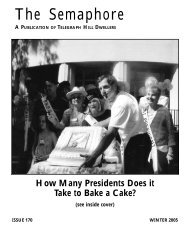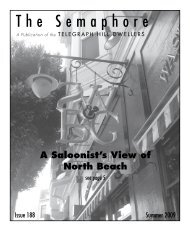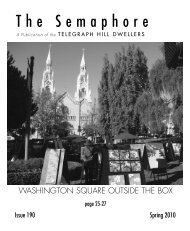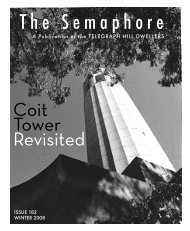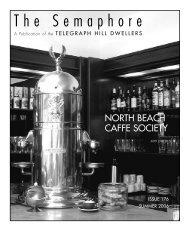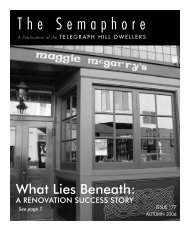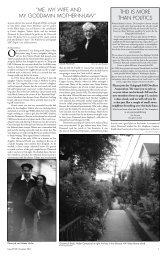Volume 155 02-2001 - Telegraph Hill Dwellers
Volume 155 02-2001 - Telegraph Hill Dwellers
Volume 155 02-2001 - Telegraph Hill Dwellers
You also want an ePaper? Increase the reach of your titles
YUMPU automatically turns print PDFs into web optimized ePapers that Google loves.
I SSUE #<strong>155</strong> • SPRING <strong>2001</strong> PAGE 24<br />
Art’s mother still reminds him, “began when<br />
you and I hid in rice patties, under water,<br />
breathing through straws, to escape marauding<br />
Japanese troops”.<br />
After the War, Wai Park, ex-GI, was able to<br />
bring his wife and Art, the then youngest child,<br />
to this country; Art’s three older siblings (a<br />
brother and two sisters) remained in Hong Kong.<br />
So at age five, Art Dong, knowing not a<br />
word of English, arrived by sea in San Francisco.<br />
The family seems to have flourished almost<br />
immediately. A sewing factory was begun.<br />
Property on Jackson Street consisting of three<br />
flats and a house in back (in which Marshall<br />
and his mother still live) was purchased with a<br />
distant cousin. When the sewing operation<br />
closed, it was replaced by a grocery store (now a<br />
laundromat) at Jackson and Leavenworth.<br />
In 1948, Marshall, the fifth child, was born.<br />
Both he and Art, as the years went by, worked<br />
in the family store while attending San<br />
Francisco public schools. By the mid-1960’s,<br />
Art had “done everything”, working in gas stations,<br />
in construction, even as a cook at<br />
Seattle’s World Fair. He was now back in San<br />
Francisco and Marshall was at City College.<br />
In 1967, a fateful event occurred. Marshall,<br />
looking for part-time work, heard that George<br />
Atashkarian was seeking to hire someone.<br />
George had taken over Speedy’s in 1964 from<br />
Leo and Irene Wiatrack who, in turn, had<br />
bought it in 1954 from the Spediaccis, the family<br />
after whom Speedy’s takes its name and who<br />
had run the store since the 1920’s.<br />
Marshall’s “part-time” job soon found him<br />
at Speedy’s over fifty hours a week; not a lot of<br />
time or energy was left for City College. A year<br />
later, war once again intervened in the Dong<br />
family’s affairs; Marshall was drafted. Who better<br />
to take his place at Speedy’s than brother<br />
Art, then working at JC Super in the Mission?<br />
Marshall went to war, and Art arrived on<br />
<strong>Telegraph</strong> <strong>Hill</strong> (for a fictionalized glimpse of Art<br />
in his early years on the <strong>Hill</strong>, take a look at the<br />
character of Lyle Wong in Armisted Maupin’s<br />
Tales of the City).<br />
Two years later, Marshall was honorably discharged<br />
and, by law, could have demanded his job<br />
back at Speedy’s. But Art was now married, and<br />
Marshall was still single, so Art stayed on while<br />
Marshall found work elsewhere, eventually ending<br />
up at “Princess Pat’s,” a grocery store owned<br />
by a Greek woman at Sacramento and Polk.<br />
In 1978, George Atashkarian decided it was<br />
time to sell Speedy’s, and Art and Marshall<br />
Dong were ready to buy it. The deal was made,<br />
and Art and Marshall took over, renting out the<br />
meat department to Bill Wong, an arrangement<br />
which lasted until the latter’s death.<br />
About this time, Marshall married; he has<br />
two children, Adam and Stephanie, and a stepdaughter,<br />
Michelle. There are likewise two children<br />
of Art’s marriage, a son, Craig, now a San<br />
Francisco police officer, and a daughter, Colette,<br />
a nurse.<br />
The two brothers incorporated the store,<br />
graciously acknowledging the heritage of the<br />
Spediacci family by naming it “Speedy’s<br />
Grocery, Inc. dba [doing business as] New<br />
Union Grocery”. In a move of some prescience,<br />
they became union employees of their own<br />
company, thus laying the groundwork for union<br />
health and pension benefits.<br />
After more than thirty years, it is to be<br />
expected that a routine has been established.<br />
The store is open seven days a week. Art opens<br />
it up at 8:00 a.m. and stays until after it closes,<br />
which, theoretically, is 7:00 p.m., though often<br />
later. Sundays are an exception, the hours being<br />
10:00 to 6:00. Since Art commutes from<br />
continued next page




